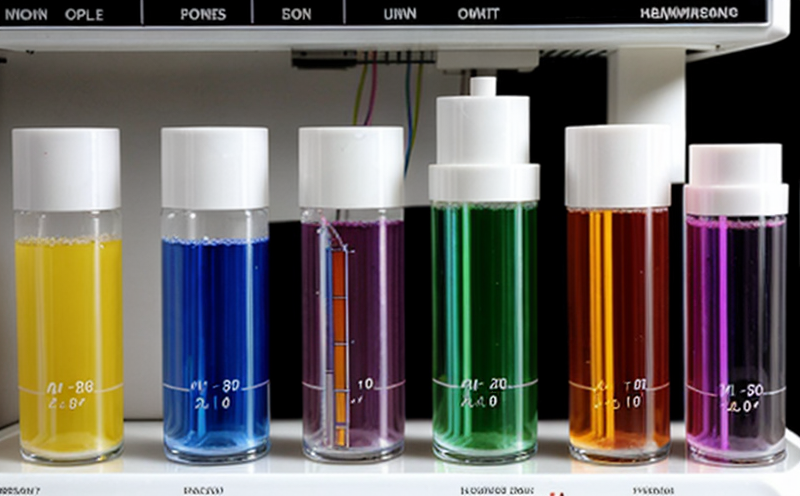ISO 27108 Pharmaceutical Residue Testing by HPLC
The ISO 27108 standard mandates the use of High-Performance Liquid Chromatography (HPLC) for testing pharmaceutical residues in food. This service is essential for ensuring compliance with international standards, thereby protecting public health and maintaining product integrity.
Compliance with ISO 27108 is critical for the pharmaceutical industry as it ensures that residues from drug products do not contaminate food. The testing process involves meticulous sample preparation and analysis to identify potential contaminants. Our laboratory utilizes state-of-the-art HPLC equipment, ensuring precise and accurate results.
The scope of this service includes the identification and quantification of residues in various food types, including fruits, vegetables, dairy products, and processed foods. We adhere strictly to the methodologies outlined in ISO 27108, which ensures reliability and consistency across all tests. Our team of experts is well-versed in handling complex samples and delivering accurate results.
The testing process begins with sample collection, followed by thorough preparation to ensure representative analysis. The prepared samples undergo HPLC analysis, a technique that separates the components based on their interactions with the stationary phase. This separation allows for precise quantification of residues according to the specified limits in ISO 27108.
Our laboratory employs rigorous quality control measures and follows strict protocols to ensure accurate and reproducible results. We use validated methods and up-to-date calibration standards, ensuring that our tests meet or exceed international standards. Our commitment to excellence is reflected in our adherence to ISO/IEC 17025 accreditation, which guarantees the highest level of competence and reliability.
Client satisfaction is paramount, and we strive to provide timely reports with detailed interpretations. Our experienced team can offer valuable insights into potential risks associated with residue contamination and suggest mitigation strategies. By partnering with us, organizations can ensure that their products meet stringent regulatory requirements and maintain consumer trust.
In conclusion, ISO 27108 Pharmaceutical Residue Testing by HPLC is a critical service for ensuring food safety in the pharmaceutical industry. Our expertise in this area allows us to provide reliable and compliant testing, protecting public health and maintaining product integrity.
Quality and Reliability Assurance
The quality and reliability of our ISO 27108 Pharmaceutical Residue Testing by HPLC service are paramount. Our laboratory is accredited under the ISO/IEC 17025 standard, ensuring that all tests meet the highest standards of accuracy and precision.
We follow strict protocols for sample preparation and analysis, using state-of-the-art HPLC equipment to ensure consistent results. Our quality control measures include regular calibration checks and method validation, which are critical in maintaining the integrity of our testing process.
Our team of experts is trained to handle complex samples with precision, ensuring accurate identification and quantification of residues. We also provide detailed reports that offer insights into potential risks and mitigation strategies. This service not only meets regulatory requirements but also enhances product safety and consumer trust.
We invest in continuous improvement and training for our staff to stay abreast of the latest developments in pharmaceutical residue testing. Our commitment to quality is reflected in our adherence to international standards, ensuring that we deliver reliable and compliant results every time.
International Acceptance and Recognition
The ISO 27108 Pharmaceutical Residue Testing by HPLC service enjoys widespread international acceptance due to its stringent standards and rigorous testing protocols. This service is recognized globally as a benchmark for ensuring that residues from pharmaceutical products do not contaminate food.
Many countries have adopted this standard, recognizing the importance of preventing contamination in the food supply chain. Compliance with ISO 27108 ensures that products meet regulatory requirements and maintain consumer trust. Our laboratory's adherence to these standards is reflected in our accredited status under ISO/IEC 17025, which guarantees the highest level of competence and reliability.
By partnering with us, organizations can ensure that their products meet stringent regulatory requirements. This service is not only beneficial for pharmaceutical companies but also for food producers who need to demonstrate compliance with international standards.
The recognition of ISO 27108 extends beyond national borders, making it a globally accepted standard. Our laboratory's expertise in this area allows us to provide reliable and compliant testing, protecting public health and maintaining product integrity.
Environmental and Sustainability Contributions
The ISO 27108 Pharmaceutical Residue Testing by HPLC service also contributes positively to environmental sustainability. By ensuring that pharmaceutical residues do not contaminate food, we help reduce the risk of environmental pollution and promote a safer ecosystem.
This service plays a crucial role in preventing contamination from drug products, which can have harmful effects on both human health and wildlife. By adhering to international standards, we contribute to the preservation of natural resources and the overall well-being of ecosystems.
The rigorous testing process ensures that only compliant products reach the market, reducing the likelihood of unintended environmental impacts. Our commitment to sustainability is further reflected in our adherence to ISO/IEC 17025 accreditation, which guarantees the highest level of competence and reliability.
By choosing this service, organizations not only meet regulatory requirements but also contribute to a healthier environment and a safer food supply chain. This aligns with broader sustainability goals and enhances public trust in the products they consume.





